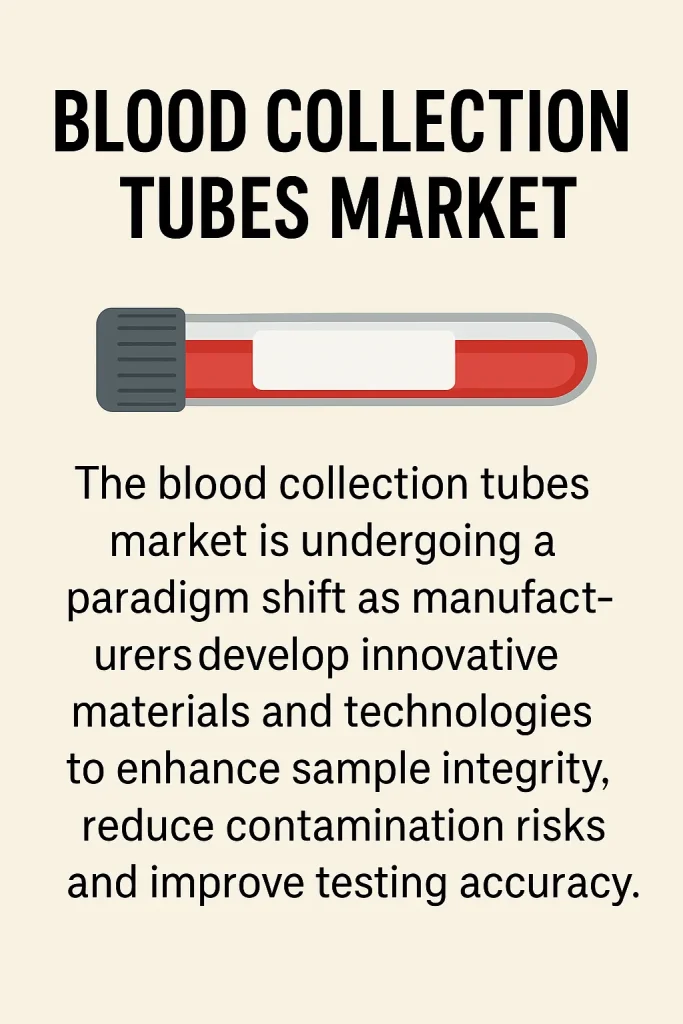Under the dynamic nature of the manufacturing industry, innovation and accuracy are some of the factors that spearhead the success of most products. The blood collection tube, more popularly referred to as a Vacutainer, is one of the products that are of great significance in the medical research and healthcare field. We will discuss market forecast predictions and need of blood collection tubes, growth potential of the same and how they are formed in this article to assist the entrepreneur/startup in the industrial area.
Market Forecast and Overview.
Global blood collection tubes industry has been somewhat robust, and with steady growth. This expansion may be explained by an increased occurrence of the chronic diseases, the rise in need in the diagnostic procedures, and the enhancement of the healthcare facilities. The market intelligence shows that the blood collection tubes market will be growing in the near future, and demand will be increasing fast to have specific blood collection tubes to perform specific diagnostic tests. It is a space that can be considered interesting by entrepreneurs who would like to manufacture blood collection tubes.
Project Report Detail Blood Collection Tubes ( Vacutainer ) detail.
Demand and Growth Drivers
The increased priority of detecting disease at its early stages and personalized medicine is also generating a demand of new blood collection tubes boasting of such qualities as stability of their samples, compatibility with the type of tests, and reduced risk of contamination. Moreover, the embrace of point-of-care testing and the increased investigative activity in the field of the lab, such as genomics and proteomics, is an ongoing trend that would lead to the further growth of blood collection tubes.
The Overview of the manufacturing Process.
The procedure of the manufacturing processes of the blood collection tubes must have tightly controlled steps in order to have a control on the quality of the product, its sterility and its regulatory requirements. As a rule, it starts with the preparation of excellent raw materials and finally, the producers will inject moulded tubes parts accurately. The manufacturers will then pour in the required reagents and the last step will be joining the parts in a sterile state to obtain repeatability, safety and compliance to acceptable standards.
After the production is done, the manufacturer conducts quality control in order to continually measure the dimensional properties, additive contents, and sterility; the manufacturers also employ verified sterilization methods, in addition to the traceability to protect sample integrity. As part of sustaining on the varying market supply, the future business owners planning to open a new blood collection tube manufacturing plant can divert attention to areas of process enhancement to add automation to reduce variability and enhance throughput as well as practice the quality assurance methods fully. By doing these things they
Trends and Opportunities in the Market.

The situation with the blood collection tubes market is shifting towards a paradigm shift since manufacturers are coming up with innovative materials and technologies to improve on the sample integrity, lessen the occurrences of contamination, and increasethe accuracy of testing.
In addition, as personalized medicine is emerging and more focus on preventive healthcare, it has become more and more demanded that the tubes have high performance and wide compatibility with various diagnostic assays. As a result, those entrepreneurs that invest in specific research and development are able to develop solutions to blood collection next generation that directly respond to the current demands and changes of the needs of healthcare providers and researchers, seize new market segments and forces competitive advantage.
For more information :- Visit
Quality Assurance and Regulatory Compliance.
Since the healthcare sector is a very regulatory sector, compliance to quality standards and regulatory measures is the most important aspect of blood collection tubes manufacturers. Product safety, efficacy and consistency: Due to the intensive quality assurance procedures and their adherence to international standards like ISO 13485, the product ought to gain acceptance in the market as well as establish trust among the consumers. Businesspeople should value quality management, validation testing, and documentation procedures to show their interest in the product quality and adherence to regulations.
Other relevant articles- India Vacuum Blood Collection Tube Market.
Raw Material sourcing and Supply Chain Management.
Efficiency in the supply chain management and acquisition of raw materials remains crucial in the manufacturing of blood collection tubes. The importance of risk anticipation, consisting of working with consistent suppliers is essential to minimize the lead-time risk, and is crucial in continuity. Inventory that is accumulated on demand and production and delivery on a just-in-time basis will also allow the company to eliminate the underutilized resources and apply a lean method, having less carrying cost.
This way, the owners ought to undertake the due diligence of their suppliers of raw materials, audit quality control assurance, establish terms that are long-term, favorable terms, performance metrics, and service level agreement in the transition period. Being transparent with suppliers, having the potential to solve problems may potentially disrupt the process of supply and in the long term becoming a bit more responsive and developing suppliers, which will ensure a known component supply chain and the most important is competitive supply and response in the marketplace.
Corporate Social responsibilities and Environmental sustainability.
During the time when human awareness of the environment and their social responsibility is quite high, blood collection tubes manufacturers start devoting more attention to the sustainability and environmentally-friendly programs. Green manufacturing process, minimized waste production, and minimized carbon footprint are not only ethical considerations but also strategic benefits, which has the potential of improving brand image, and appeal to green-conscious consumers.
After making the commitment towards their sustainability, entrepreneurs have an opportunity to utilize environmental friendly technology, recycle, implement energy saving measures within their business processes to ensure that the business operations are in line with the international sustainability objectives and industry best practice.
Related articles:- A Booming Business of Blood Collection Tubes (Vacutainer)
Future Outlook and Innovation Strategies
Entrepreneurs must stay abreast of emerging trends such as digital health integration, smart diagnostics, and telemedicine t;o position their products for success in a digitally connected world.
By fostering a culture of innovation, investing in research and development, and collaborating with industry partners and research institutions, startups can differentiate themselves in the competitive market and pioneer groundbreaking solutions that revolutionize healthcare delivery and patient outcomes.
Niir Project Consultancy Services (NPCS)
Niir Project Consultancy Services (NPCS) provides Market Survey cum Detailed Techno Economic Feasibility Reports, equipping entrepreneurs and businesses with strategic insights to establish new ventures. Their comprehensive reports encompass detailed analyses of manufacturing processes, raw material sourcing, plant layout optimization, and financial projections, empowering entrepreneurs to make informed decisions and assess the feasibility of their industrial projects. With NPCS as a trusted partner, entrepreneurs can navigate the complexities of the manufacturing landscape with confidence and clarity.
Conclusion
In conclusion, the blood collection tubes market presents a promising arena for entrepreneurs aiming to venture into the manufacturing sector. By strategically capitalizing on the growing demand for advanced diagnostic solutions and simultaneously leveraging the expertise of industry-leading consultancy services like NPCS, startups can effectively position themselves for long-term success in this dynamic industry.
Moreover, with a well-planned approach to product development, continuous process optimization, and targeted market positioning, entrepreneurs can unlock the vast potential of blood collection tubes while also driving innovation and shaping the future of healthcare and medical research.
Find best business ideas for yourself our startup selector tools
Frequently Asked Questions
What are blood collection tubes, and how are they used?
Sterile, sealed blood collection tubes collect, transport, and preserve blood samples for clinical testing and research. Manufacturers fill them with specific additives or anticoagulants tailored to the required diagnostic tests, and the tubes maintain sample integrity from collection through analysis.
What types of blood collection tubes are commonly available?
Blood collection tubes vary by additive and intended use, including plain tubes for serum, tubes with clot activators, tubes containing anticoagulants such as EDTA or heparin, and specialized tubes for molecular testing or trace element analysis. Selection depends on the test protocol and the stability requirements of the analyte.
How are blood collection tubes sterilized and quality controlled?
Manufacturers use validated sterilization methods such as gamma irradiation or ethylene oxide and implement rigorous in-process and final quality checks to verify sterility, dimensional accuracy, additive concentration, and compatibility with laboratory instruments. Documented quality management systems and batch traceability are essential components of compliance.
What regulatory standards apply to blood collection tube manufacturing?
Blood collection tube manufacturers must comply with applicable medical device regulations and standards, including quality management system requirements like ISO 13485 and regional regulatory clearances or registrations based on the target markets. Regulatory submissions must be supported by validation data, stability studies, and risk assessments.
How should blood collection tubes be stored, and what is their typical shelf life?
Manufacturers recommend storing tubes in a clean, dry environment away from direct sunlight and extreme temperatures, and users should follow the manufacturer’s recommended conditions. Manufacturers determine shelf life through stability testing and specify it on the product label.








